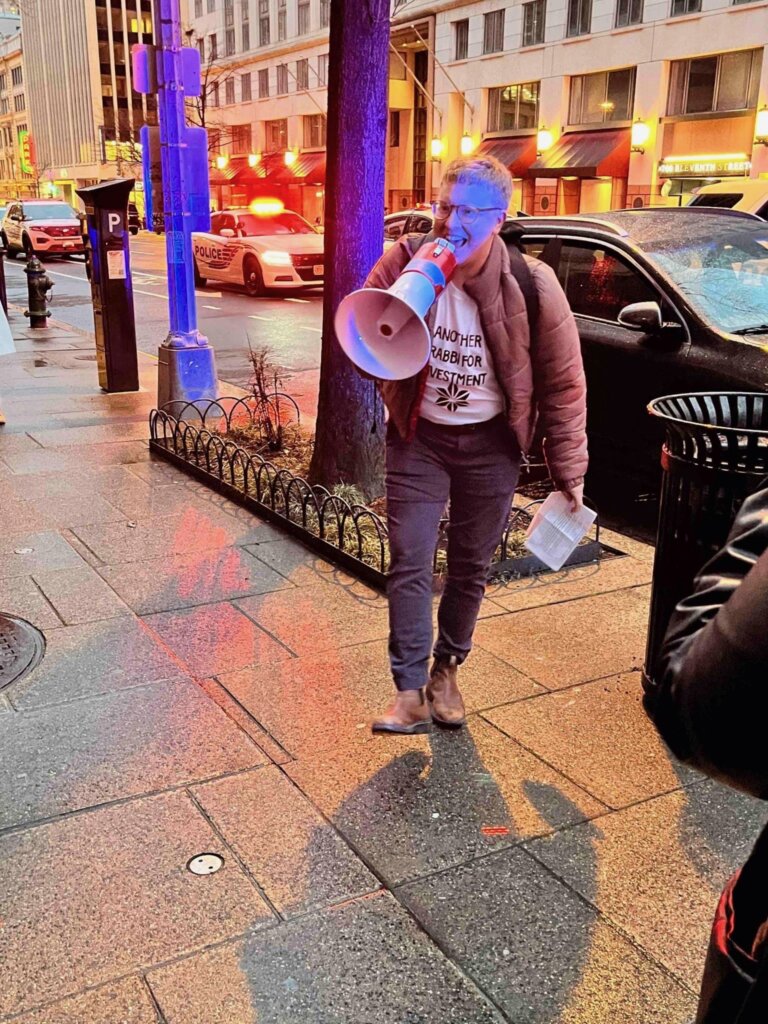Hundreds of Jews and Palestinians decry Israeli minister at parallel Washington protests
Two different protests denounced Bezalel Smotrich at an Israel Bonds conference

Graphic by Angelie Zaslavsky
Hundreds of protesters greeted Bezalel Smotrich, Israel’s far-right finance minister, outside the Washington, D.C., hotel where he addressed an Israel Bonds conference Sunday evening.
The remarkable scene outside the hotel — two separate protests focused on Israel — had little precedent in American history. One crowd waved Palestinian flags, the other, Israeli flags. But both delivered similar messages denouncing Bezalel Smotrich, the Israeli finance minister, and the hard right turn the Israeli government has taken since Benjamin Netanyahu won a sixth term as prime minister in November.
The demonstrators showed up outside the hotel ahead of Smotrich, leader of the far-right Religious Zionist party, who made headlines earlier this month for saying that the Israeli military should have destroyed a Palestinian village following a terrorist attack. Israel Bonds was one of the few organizations that agreed to host the controversial politician.
“I’m thrilled to be here as part of your welcoming committee,” Rabbi Esther Lederman, of the Union for Reform Judaism, told a raucous crowd of roughly 400 people gathered on the sidewalk outside the Grand Hyatt, waving Israeli flags and holding signs condemning the Israeli government’s proposed changes to its judicial system — changes opponents deem anti-democratic.
They had been organized by Americans for Peace Now and a coalition of other liberal Zionist organizations, along with a group of Israeli expatriates. Around the corner an equally spirited group of about 75 anti-Zionist protesters waved Palestinian flags.
“No to Smotrich, no to hate,” read posters produced by J Street, the liberal Zionist group that lobbies for a two-state solution to the Israeli-Palestinian conflict.
“Smotrich supports genocide,” was the message on the placards from Jewish Voice for Peace, an anti-Zionist group that supports a boycott of Israel.
It was the largest protest against the Israeli government and its proposed judicial reforms, along with other far-right policies, in the United States, following several smaller protests in recent weeks. In Israel in past weeks, hundreds of thousands of people have gathered to demonstrate against the government, including a crowd of 500,000 Saturday night.
One adversary, two protests
Police — who parked more than a dozen squad cars outside the hotel — seemed confused by the two events. When an elderly woman holding a combination Israeli and Palestinian flag tried to cross the street from one protest to the other, a police officer intervened. Though she insisted that the protestors were not opposed to one another, the officer was unswayed. “But you’re always on opposite sides,” the officer said.
The two groups made different demands, however. At the protest organized by Jewish Voice for Peace, chants called for a boycott of Israel. Sanaz Ghodsi, a graduate student at George Washington University, said she didn’t see much common ground with the liberal Zionists across the street.
Ghodsi said she believed the only fair resolution to the conflict was for all the Jews in Israel to be forced to immigrate to Europe or elsewhere.
But others were more optimistic.

Jonathan Kuttab, executive director of Friends of Sabeel North America, a Palestinian advocacy organization, traveled from Pennsylvania to attend the protest. “I think it’s a good thing,” he said of the liberal Zionists protesting across the street, and added that liberal Zionists in Israel needed to join with the Arab parties if they wanted to oust the far-right government led by Benjamin Netanyahu.
“Without the Arabs, they’re not going to win against the fascists,” he said.
At the Americans for Peace Now event, a woman at the front of the crowd held an “I love Israel” sign, and the speakers emphasized that they were there to support the massive Israeli protests against the current government, and not to undermine the country itself.
“We’re here today to say our friends in Israel are not alone,” said Sheila Katz, chief of the National Council of Jewish Women. “We, the American Jewish community, who believe in the original vision and promise of the State of Israel, will not stand idly by.”
Scuffles with police
Security was tight inside and outside the hotel with a heavy police presence. Those officers were called into action twice, first when Jewish Voice for Peace activists, including four rabbis and three rabbinical students, tried to unfurl a banner in the lobby reading “apartheid is funded here,” but an officer quickly snatched it and the group was escorted out.
A few minutes later, IfNotNow, a group opposed to the Israeli occupation, staged its own demonstrations in the atrium, one floor above the Israel Bonds conference. Hotel security wrestled with the demonstrators over two canvas banners, and police eventually arrested several activists as they sang Hebrew songs.
The incidents caused a stir in the lobby, which was full of public officials and others attending a public transit conference in the building. “It’s actually quite beautiful,” one woman said of songs the IfNotNow protesters were singing. “I just wish I knew what it meant.”

















